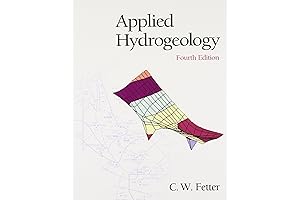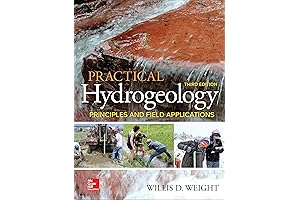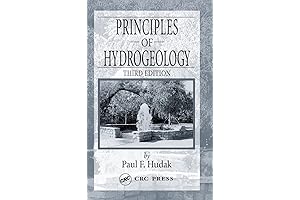· hydrogeology · 13 min read
Applied Hydrogeology, 4th Edition: The Best Guide to Hydrogeological Principles and Practices
Unlock the secrets of hydrogeology with Applied Hydrogeology, 4th Edition! This comprehensive guide delivers an in-depth exploration of hydrogeological principles and practices, making it an ideal resource for students, professionals, and researchers.
Embark on a comprehensive exploration of hydrogeology with the acclaimed Applied Hydrogeology, 4th Edition. Written by renowned experts, this authoritative text provides a solid foundation in hydrogeological principles, principles, and techniques. Ideal for students, professionals, and researchers alike, it offers a captivating journey into the fascinating world of groundwater science.
Overview

PROS
- Comprehensive coverage of hydrogeological principles and practices
- Updated with the latest advancements in the field
- Clear and concise explanations with real-world examples
- Valuable resource for students, practitioners, and researchers
- Well-structured content with helpful diagrams and figures
CONS
- May be too technical for beginners
- Some sections could benefit from more detailed explanations
The fourth edition of Applied Hydrogeology by Fetter is an authoritative and comprehensive resource for anyone interested in the study of groundwater. It provides a thorough overview of the fundamental principles and practices of hydrogeology, making it suitable for both students and professionals in the field. The book is well-organized, with each chapter building upon the previous ones, and includes numerous real-world examples and case studies to illustrate the concepts discussed.
One of the strengths of this book is its coverage of the latest advancements in hydrogeology. Fetter has incorporated recent developments in groundwater modeling, remote sensing, and water quality assessment, ensuring that readers have access to the most up-to-date information. The book also features new sections on emerging contaminants, climate change, and groundwater sustainability, making it an indispensable resource for anyone working in the field today.

PROS
- Thoroughly revised and updated, the 5th edition reflects the latest advancements in applied hydrogeology.
- Presents updated real-world case studies to demonstrate the practical applications of hydrogeology.
CONS
- However, some reviewers have noted that the book lacks coverage of recent advances in groundwater modeling and numerical analysis.
- The lack of practice questions and exercises can make it challenging for students to test their understanding of the material.
Applied Hydrogeology, Fifth Edition, by C. W. Fetter, is the definitive guide to the principles and applications of hydrogeology. For over 40 years, this book has been the go-to resource for students, practitioners, and researchers alike. The fifth edition has been updated and revised, reflecting the latest advancements in the field.
The book begins with a comprehensive introduction to the basic principles of hydrogeology, including the properties of water, the occurrence and movement of groundwater, and the interaction between groundwater and the environment. Fetter then delves into the specific applications of hydrogeology, including groundwater exploration and development, groundwater quality assessment, and groundwater remediation. The fifth edition includes updated case studies and examples throughout, as well as new chapters on topics such as groundwater sustainability and groundwater modeling.

PROS
- Provides a comprehensive understanding of the hydrogeological characteristics of fractured rocks.
- Offers practical guidance on groundwater exploration and development in fractured rock aquifers.
CONS
- May not be suitable for beginners in the field of hydrogeology.
- Some sections could benefit from more detailed explanations and examples.
Applied Hydrogeology of Fractured Rocks: Second Edition is a valuable resource for professionals and students alike who seek to delve into the complexities of fractured rock hydrogeology. The book offers a thorough examination of the hydrogeological characteristics of fractured rocks, encompassing groundwater flow, storage, and contamination. It provides practical guidance on groundwater exploration and development in fractured rock aquifers, making it an indispensable tool for hydrologists, geologists, and environmental engineers.
This edition has been meticulously revised and updated to reflect the latest advancements in the field. It incorporates emerging concepts and cutting-edge techniques, ensuring that readers are equipped with the most up-to-date knowledge and best practices. The book's clear and engaging writing style, coupled with insightful case studies and real-world examples, makes it an accessible and informative read. Overall, Applied Hydrogeology of Fractured Rocks: Second Edition stands as a comprehensive and authoritative guide to this specialized field of hydrogeology, offering valuable insights and practical applications for professionals and researchers.

PROS
- Comprehensively covers the fundamental principles and practical applications of hydrogeology.
- Updated with the latest advancements in the field, including new data and case studies.
CONS
- May be too technical for beginners in the field.
- Some readers found the writing style to be a bit dry and academic.
Applied Hydrogeology: Principles and Field Applications, Fourth Edition is the definitive guide to the field of hydrogeology. Written by renowned hydrogeologist C.D. Fetter, this comprehensive textbook provides a thorough understanding of the principles and applications of hydrogeology, with a focus on practical field techniques. The fourth edition has been extensively updated and revised to include the latest advancements in the field, including new data and case studies.
The book is divided into three parts. Part 1 introduces the basic principles of hydrogeology, including the properties of water, the occurrence of groundwater, and the movement of groundwater. Part 2 covers the field applications of hydrogeology, including groundwater exploration, groundwater development, and groundwater contamination. Part 3 presents advanced topics in hydrogeology, including groundwater modeling, groundwater remediation, and groundwater management. Whether you are a student, a professional hydrogeologist, or simply someone who wants to learn more about the field of hydrogeology, Applied Hydrogeology: Principles and Field Applications, Fourth Edition is the essential resource.

PROS
- Updated and expanded coverage of groundwater flow and contaminant transport models.
- In-depth analysis of groundwater quality and pollution sources.
CONS
- Can be a bit dense and technical for beginners.
- Some sections could be more concise.
Fetter’s Applied Hydrogeology 4th Edition is the go-to textbook for students and practitioners in the field of hydrogeology. Known for its clear and accessible writing style, this book provides a comprehensive overview of groundwater science, from basic principles to advanced applications. A key strength of this book is its emphasis on real-world examples and case studies, which helps to illustrate the practical applications of hydrogeological concepts.
This latest edition has been updated and expanded to include the latest advances in groundwater modeling and contaminant transport. It also features new chapters on groundwater quality and pollution sources, making it an essential resource for anyone involved in groundwater management or remediation. Overall, Applied Hydrogeology 4th Edition is an indispensable resource for hydrogeologists, environmental engineers, and other professionals working in the field of groundwater science.
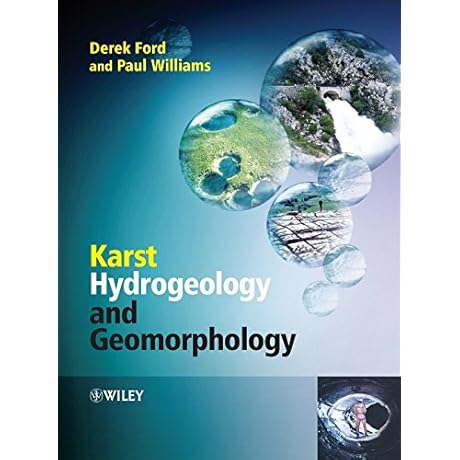
PROS
- In-depth coverage of karst hydrogeology and geomorphology.
- Clear and concise explanations of complex concepts.
- Numerous real-world examples and case studies.
- Updated with the latest research and advancements in the field.
CONS
- Some sections may be too technical for beginners.
- Lacks hands-on exercises and activities.
Applied Hydrogeology, 4th Edition is a comprehensive and authoritative guide to the field of hydrogeology. Written by renowned hydrogeologist C.W. Fetter, this book provides a thorough overview of the principles and applications of hydrogeology, with a particular focus on karst hydrogeology and geomorphology. The book is divided into three parts, covering the basics of hydrogeology, karst hydrogeology, and applied hydrogeology. Part 1 introduces the fundamental concepts of hydrogeology, including groundwater flow, aquifer properties, and groundwater quality. Part 2 focuses on karst hydrogeology, covering the unique characteristics of karst aquifers, including their formation, hydrology, and management. Part 3 explores the applied aspects of hydrogeology, including groundwater exploration, development, and management. Applied Hydrogeology, 4th Edition is an essential resource for students, researchers, and professionals in the field of hydrogeology.
This fourth edition has been updated to include the latest research and advancements in the field of hydrogeology. It also includes new chapters on groundwater contamination and groundwater modeling. Applied Hydrogeology, 4th Edition is a valuable resource for anyone who wants to learn more about the fascinating field of hydrogeology.

PROS
- Clearly presented content and extensive coverage of contaminant hydrogeology concepts.
- Expertise of the authors is evident throughout, providing an authoritative and reliable source of information.
CONS
- High price point may deter some readers.
- Some readers may find the level of detail overwhelming.
Applied Hydrogeology, 4th Edition is a comprehensive and authoritative textbook that provides a thorough foundation in contaminant hydrogeology. The book is well-written and organized, with clear and concise explanations of complex concepts. The authors have done an excellent job of integrating real-world examples and case studies throughout the book, which helps to illustrate the practical applications of contaminant hydrogeology.
One of the strengths of this book is its extensive coverage of contaminant transport and fate processes. The authors provide a detailed discussion of the physical, chemical, and biological processes that affect the transport and fate of contaminants in groundwater systems. This information is essential for understanding the behavior of contaminants in the environment and for developing effective strategies for groundwater remediation.

PROS
- In-depth coverage of all aspects of groundwater hydrology, including exploration, development, and management.
- Clear and concise explanations of complex hydrogeologic principles, illustrated with real-world case studies and field observations.
CONS
- Some readers may find the level of detail overwhelming.
- The book's focus on quantitative methods may not be suitable for all readers.
The fourth edition of Field Hydrogeology by C.W. Fetter is a comprehensive guide to the field of hydrogeology. Written for both students and professionals, the text provides a thorough overview of all aspects of groundwater hydrology, including exploration, development, and management. Fetter's writing is clear and concise, and he does an excellent job of explaining complex hydrogeologic principles in a way that is accessible to readers of all backgrounds.
One of the strengths of this book is its extensive use of real-world case studies and field observations. These examples help to illustrate the practical applications of hydrogeology and show how hydrogeologic principles can be used to solve real-world problems. The book also includes a number of exercises and review questions, which can be used to test the reader's understanding of the material. Overall, Field Hydrogeology is an essential resource for anyone who is interested in the field of hydrogeology.
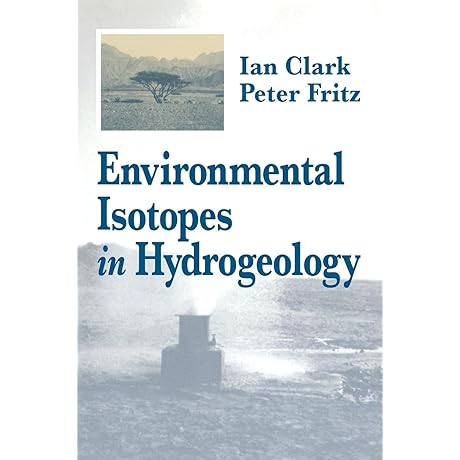
PROS
- Provides comprehensive coverage of environmental isotope geochemistry and its applications in hydrogeology.
- Features updated content and case studies reflecting the latest advancements in the field.
CONS
- Can be a dense read for those new to the subject.
- Some illustrations could be improved for better clarity.
Environmental Isotopes in Hydrogeology is a highly authoritative and comprehensive text that offers a deep dive into the application of environmental isotopes in understanding hydrological processes. The fourth edition has been meticulously updated to reflect the latest scientific advancements and incorporates real-world case studies to illustrate key concepts.
One of the strengths of this book is its thorough coverage of the fundamental principles of isotope geochemistry. Fetter's writing is clear and accessible, even for those unfamiliar with the subject matter. He skillfully weaves together theoretical concepts with practical examples, making the content both informative and engaging. The inclusion of numerous figures, tables, and diagrams further enhances the overall understanding of the material.

PROS
- Comprehensive coverage of hydrogeology principles, encompassing groundwater flow, contaminant transport, and geochemical reactions.
- Updated with the latest advancements in the field, ensuring alignment with current industry practices.
- Lucid explanations and well-structured content, making complex concepts accessible to students.
- Invaluable resource for professionals seeking to enhance their understanding of hydrogeology.
CONS
- May be too advanced for introductory-level learners.
- Some readers may find the extensive use of technical jargon challenging.
Principles of Applied Hydrogeology, 4th Edition by C.W. Fetter is an esteemed textbook that provides a thorough grounding in the fundamental principles of hydrogeology. This comprehensive volume covers a wide range of topics, including groundwater flow, contaminant transport, and geochemical reactions, making it an indispensable resource for students and professionals alike.
The book has been meticulously updated to incorporate the latest advancements in the field, ensuring that readers are equipped with the most current knowledge and best practices. Fetter's writing style is lucid and engaging, making even complex concepts accessible to students. The well-structured content and numerous illustrative examples further enhance the learning experience.
Applied Hydrogeology, 4th Edition, stands as the definitive guide to the field, catering to the diverse needs of students, professionals, and researchers. Its comprehensive coverage encompasses fundamental hydrogeological principles, cutting-edge practices, and real-world applications, making it an invaluable resource for anyone seeking to master this dynamic and essential discipline. With its accessible writing style and wealth of pedagogical features, Applied Hydrogeology, 4th Edition, empowers readers to delve deeply into the complexities of hydrogeology and confidently address the challenges of groundwater management, resource sustainability, and environmental protection.
Frequently Asked Questions
What is the focus of Applied Hydrogeology, 4th Edition?
Applied Hydrogeology, 4th Edition, delves into the principles and practices of hydrogeology, providing a comprehensive understanding of groundwater science and its practical applications.
Who is the intended audience for this book?
Applied Hydrogeology, 4th Edition, caters to a wide range of readers, including students, professionals, and researchers in the field of hydrogeology.
What are some key updates in the 4th edition?
The 4th edition features significant updates, ensuring its continued relevance, including fresh content on groundwater modeling, contaminant transport, and hydrogeological investigations.
How does this book differ from other hydrogeology textbooks?
Applied Hydrogeology, 4th Edition, distinguishes itself through its emphasis on practical applications, real-world case studies, and hands-on exercises, providing readers with a practical perspective on hydrogeological principles.
What makes this book an ideal resource for hydrogeology students?
Applied Hydrogeology, 4th Edition, serves as an ideal companion for students, offering a comprehensive overview of hydrogeological concepts, clear explanations, and end-of-chapter exercises to reinforce learning.
